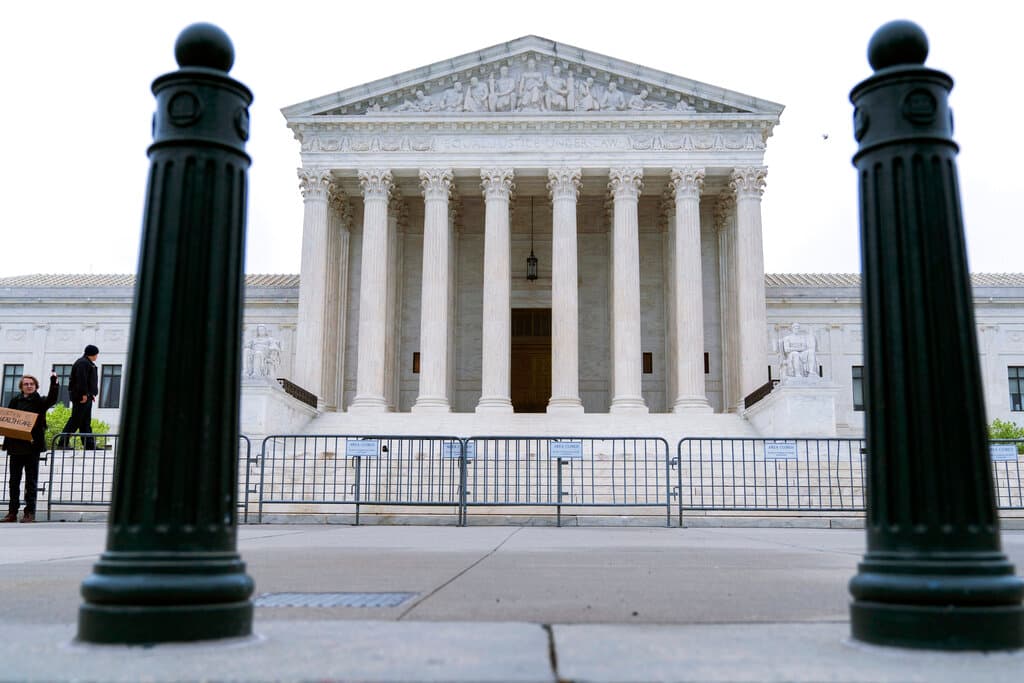Jewish State Boycott Could Reach the U.S. Supreme Court
‘A private business should not be required to make political positions to engage in business,’ the ACLU said.

The stage is set for a possible First Amendment battle at the Supreme Court over state laws that target the movement to boycott Israel.
That possibility snapped into focus on Thursday after the American Civil Liberties Union announced it would appeal to the Supreme Court a ruling it lost resoundingly before the riders of the Eighth United States Appeals Circuit.
The case involves a 2017 Arkansas law that banned public agencies from engaging in business with private companies that boycott Israel. It aimed to confront the boycott, divest, and sanction movement known as BDS.
BDS is a movement of individuals who side with the Palestinian Arabs in their war against the Jewish State. Their strategy consists of boycotting business conducted with the Israeli government and Israeli businesses. Opponents of the movement have called the boycotts antisemitic, and have prompted more than 35 states to attempt to pass legislation to block the boycotts of Israel and its businesses.
In 2018, a local newspaper, the Arkansas Times, tested the law. When a local state college refused to carry advertisements in the paper because the newspaper did not sign a pledge opposing a boycott of Israel, the Arkansas Times sued.
The newspaper, represented by the ACLU, sought shelter under the First Amendment. “A private business should not be required to make political positions to engage in business,” the ACLU said to Reason, a libertarian free-speech magazine.
That position was firmly rejected. The Eighth Circuit ruled nine to one in an en banc hearing that the law did not violate the First Amendment because it served a purely commercial purpose. The circuit riders held that the Arkansas law was constitutional based on a state’s right to regulate commercial activity and that signing the pledge did not imply an actual expression of speech.
One of the riders, Judge Jonathan Kobes, a Trump appointee, wrote in his opinion for the ruling: “It does not ban the Arkansas Times from publicly criticizing Israel, or even protesting the statute itself.”
The lone dissenting rider of the Eighth Circuit’s ruling, Judge Jane Kelly, an Obama appointee, argued that it “seems highly unlikely that a lay-contractor unfamiliar with this lawsuit would give the phrase ‘boycott of Israel’ the same limited definition the state now urges and the court accepts.”
A staff attorney for the ACLU, Brian Hauss, noted, “We hope and expect that the Supreme Court will set things right and reaffirm the nation’s historic commitment to providing robust protection to political boycotts.”
StandWithUs, a pro-Israel group, welcomed the decision. “This decision establishes an excellent precedent, hailing from the highest and most authoritative decision body to yet address the constitutionality of anti-boycott laws, which 34 states have passed nationwide,” a representative of the group, Jennifer Kutner, said.
Supporters of the BDS movement are frustrated with the decision. “Now, it’s up to the Supreme Court to decide if states can mandate loyalty oaths for contractors when they take up an Arkansas law banning state contractors from participating in BDS,” a one-time press secretary for Senator Sanders, Briahna Gray Joy, said.
The ACLU is expected to formalize an emergency appeal to the Supreme Court in the coming days. In order for the case to be heard, four justices would have to vote to take it up.
One justice, Brett Kavanaugh, has entertained a similar question before. A 2020 case, Agency for International Development v. Alliance for Open Society International, delved into the question of whether the American government could make federal funding contingent on nongovernmental organizations taking a public stance against prostitution and sex trafficking.
In oral arguments, Justice Kavanaugh posed a hypothetical, asking if the American government would require nongovernmental organizations to make pledges to support Israel.
“Suppose the U.S. government wants to fund foreign NGOs that support peace in the Middle East but only if the NGOs explicitly recognize Israel as a legitimate state?” the justice queried.
Justice Kavanaugh wrote the majority opinion in favor of the government, saying that “a policy explicitly opposing prostitution and sex trafficking, is not unconstitutional as applied to them.”
The ACLU attorney, Mr. Hauss seemed confident the court would consider taking up the boycott case, averring that the ruling “misreads Supreme Court precedent and departs from this nation’s longstanding traditions.”

